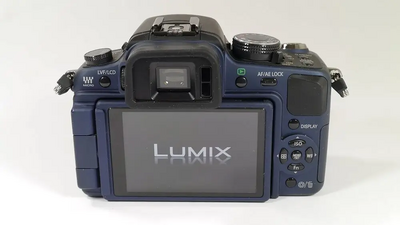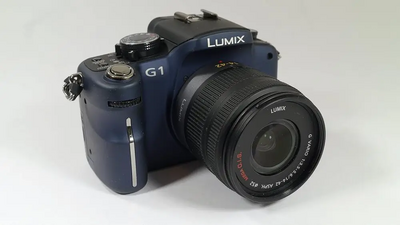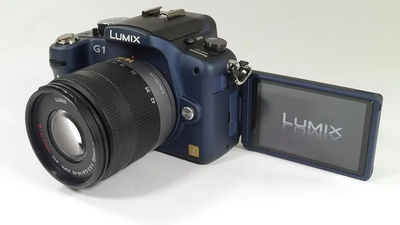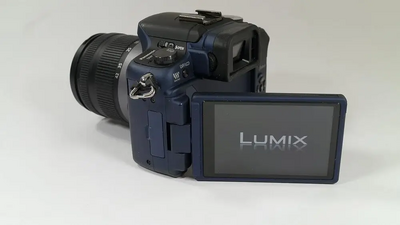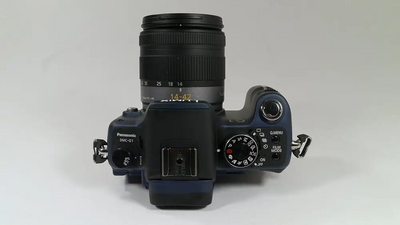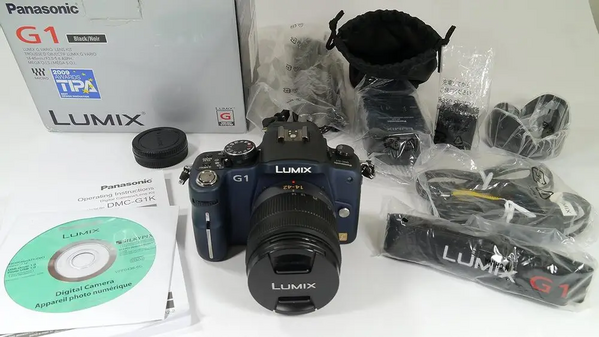
Panasonic Lumix DMC-G1
| Brand | Panasonic 2008 |
| Model | DMC-G1 Blue |
| Released Year | 2008 |
| Type | DSLR Cameras |
| Series | DMC-G |
| Color | Blue |
| Compatible Mountings | Micro Four Thirds |
| Autofocus | Contrast-detect AF system |
| Photo Sensor Resolution | 12.1 MP |
| Video Resolution | 2160p |
| Optical Zoom | 3 x |
| File Format | JPEG or RAW |
| Status | Discontinued |
Quick view
Overview
The Panasonic Lumix DMC-G1 Blue, launched in 2008, is recognized as the first camera to use the Micro Four Thirds system, significantly changing the mirrorless camera segment.
This DSLR-style camera features a 12.1-megapixel Live MOS sensor, providing good image quality with low noise levels and decent dynamic range.
It supports interchangeable lenses using the Micro Four Thirds mount, offering versatility in photo capture with a compact form factor.
The DMC-G1 includes a contrast-detect autofocus system, which, while slower than contemporary phase-detect systems, delivers accurate focusing in various lighting conditions.
It features an electronic viewfinder (EVF) with a resolution of approximately 1.44 million dots, giving photographers a digital preview with exposure and white balance information.
The camera supports HD video recording and has various shooting modes, making it a hybrid tool for both photographers and videographers.
Specifications
| Built-In Media | Battery, Battery Charger, Body Cap, Lens Cap, Remote |
| Are Batteries Included | No |
| Remote Included | No |
| Series Number | 71 |
| Global Trade Identification Number | 00037988988334 |
| UPC | 037988988334 |
| Item Height | 4.88 inches |
| Manufacturer | Panasonic |
| Exposure Control | Program (P), Aperture Priority (Av or A), Shutter Priority (Tv or S), Manual (M), Automatic (Auto) |
| White Balance Settings | Auto |
| Self Timer | 10 Seconds |
| Crop Mode | 4:3 |
| Screen Size | 3 Inches |
| Display Type | LCD |
| Dots Per Screen | 460,000 dots |
| Has Color Screen | Yes |
| Flash Memory Type | SD,SDHC |
| Write Speed | 3 fps |
| Flash Memory UHS Speed Class | UHS Speed Class 3 (U3) |
| Compatible Mountings | Micro Four Thirds |
| Sensor Type | Live MOS |
| Image stabilization | Dual |
| Maximum Aperture | 3.5 f |
| Expanded ISO Minimum | 100 |
| Photo Sensor Resolution | 12.1 MP |
| Photo Sensor Size | Micro Four Thirds |
| Maximum Shutter Speed | 1/16000 seconds |
| Minimum Shutter Speed | 1/16000 Seconds |
| Form Factor | Compact, Ultracompact |
| Special Feature | Micro Four Thirds compatible mounting |
| Color | Blue |
| Item Weight | 4.2 Pounds |
| Video Resolution | 2160p |
| Viewfinder | Electronic Viewfinder (1.44 million dots) |
| Flash Modes | Automatic |
| Camera Flash | Built-In |
| Skill Level | Professional |
| Specific Uses For Product | Everyday Photography, Versatile Lenses |
| Compatible Devices | Micro Four Thirds |
| Continuous Shooting | Up to 3 frames per second |
| Aperture modes | F5.6 |
| Flash Sync Speed | 1/160_sec |
| Video Capture Format | MP4 |
| Expanded ISO Maximum | 1600 |
| Battery Weight | 32 Grams |
| Battery Cell Type | Lithium Ion |
| Guide Number | 6.27 |
| Battery Type | Lithium Ion |
| Processor Description | venus engine |
| Aspect Ratio | 4:3 |
| File Format | JPEG or RAW |
| Effective Still Resolution | 12.1 MP |
| JPEG Quality Level | Fine |
| Supported Image Format | JPEG, RAW (.RW2) |
| Total Still Resolution | 12.1 MP |
| Maximum Focal Length | 45 Millimeters |
| Optical Zoom | 3 x |
| Lens Type | Panasonic Micro Four Thirds Zoom Lens |
| Zoom | Optical Zoom |
| Camera Lens | Lumix G Vario 14 - 45 mm F3.5 - F5.6 ASPH.Mega OIS lens |
| Minimum Focal Length | 14 Millimeters |
| Real Angle Of View | 47.08 Degrees |
| Lens Correction Type | aspherical |
| Focal Length Description | 14-45 millimeters |
| Lens Construction | [AT_LEAST_ONE_ASPHERICAL_ELEMENT] |
| Connectivity Technology | HDMI, USB |
| Wireless Technology | Yes |
| Video Output | HDMI |
| Total USB Ports | 1 |
| Total Video Out Ports | 2 |
| Shooting Modes | Automatic, Manual, Portrait, Scene |
| Digital-Still | Yes |
| Movie Mode | Yes |
| Image Capture Type | Stills & Video |
| Night vision | No |
| Auto Focus Technology | Contrast Detection |
| Focus Features | Active |
| Autofocus Points | 23 |
| Focus Type | Auto Focus |
| Focus Mode | Single-Servo AF (AF-S) |
| Autofocus | Contrast-detect AF system |
| Effective Megapixels | 12.1 MP |
| Sensor Size | 17.3 x 13.0 mm (Micro Four Thirds) |
| Lens Mount | Micro Four Thirds |
| ISO Range | ISO 100 - 3200 |
| Shutter Speed | 1/4000 to 60 seconds |
| Video Recording | HD 720p video recording |
| Display | 3.0-inch LCD (460,000 dots) |
| Storage Media | SD/SDHC Memory Card |
| Connectivity | USB 2.0, AV out |
| Battery | Rechargeable Lithium-ion battery (approx. 350 shots per charge) |
| Dimensions | 124.9 x 88.8 x 59.9 mm |
| Weight | Approximately 385 g (body only) |
Images
Key Advantages
The DMC-G1's pioneering Micro Four Thirds system allows for smaller, lighter lenses compared to traditional DSLRs.
Its EVF offers real-time previews of exposure settings, aiding in more precise control over image results.
Interchangeable lenses increase creative possibilities across different photography styles.
Compact body design improves portability without sacrificing manual control and customization.
HD video capability adds to its usefulness beyond still photography.
Intuitive interface and well-placed controls enhance user experience, especially for those transitioning from DSLRs.
Limitations
The contrast-detect autofocus system can be slower and less effective in tracking moving subjects compared to phase-detect systems in DSLRs.
The 12.1-megapixel resolution, while adequate for most applications, may feel limited compared to newer cameras.
Battery life is modest, typically requiring extra batteries for extended shoots.
The electronic viewfinder, though innovative, may not have the clarity or refresh rate of optical viewfinders used in traditional DSLRs.
Limited in-body image stabilization means reliance on stabilized lenses or external support for reducing camera shake.
Video functionality, while present, lacks some advanced features found in modern mirrorless and DSLR cameras.
FAQ
What type of sensor does the Panasonic Lumix DMC-G1 use?
The DMC-G1 uses a 12.1-megapixel Live MOS sensor compatible with the Micro Four Thirds system.
Does the DMC-G1 have an electronic or optical viewfinder?
It features a high-resolution electronic viewfinder (EVF) with approximately 1.44 million dots.
Can I record video with the Panasonic Lumix DMC-G1?
Yes, the DMC-G1 supports HD video recording, making it suitable for both photos and video.
Is the DMC-G1 still supported with firmware updates?
No, the Panasonic Lumix DMC-G1 has been discontinued and no longer receives firmware updates.
What lenses are compatible with the DMC-G1?
The DMC-G1 uses the Micro Four Thirds lens mount, compatible with a wide range of lenses from Panasonic and other manufacturers.
How does the autofocus system perform in the DMC-G1?
The contrast-detect autofocus is accurate but generally slower than phase-detect systems, particularly with moving subjects.
What is the battery life like on the Panasonic Lumix DMC-G1?
Battery life is moderate; users typically need spare batteries for longer shooting sessions.
Disclaimer
The content on is provided for general informational purposes only. We do not guarantee the accuracy, completeness, or reliability of any information, specifications, or visuals presented on the site.
is not responsible for any content, images, or data uploaded or shared by users. Users are solely responsible for the content they submit.
We may include links to third-party websites for convenience. We do not endorse or take responsibility for the content or policies of any external sites.
Use of the site is at your own risk. Always verify critical information independently before making decisions based on content from this website.

